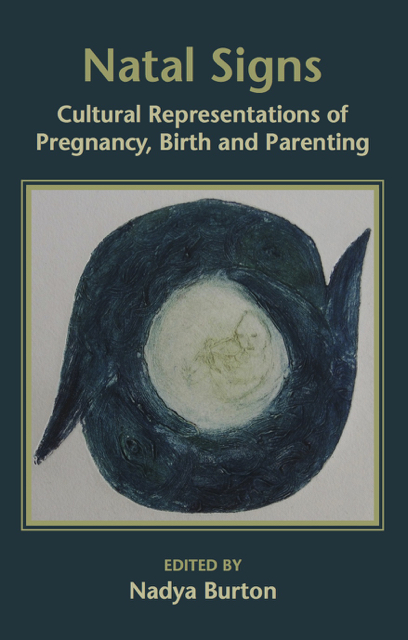
Price: $34.95
Page Count: 378
Publication Date: September 2015
ISBN: 978-1-926452-32-6
“Through vivid, intimate prose and visceral imagery, Natal Signs takes standard ideas about birth and shifts them completely. This groundbreaking book is required reading for anyone interested in an expanded understanding of the multiplicity and sensuality of pregnancy, birth and parenting.”
—May Friedman, Associate Professor, Social Work, Ryerson University
SECTION 1: LOOKING AT PREGNANCY
What to Expect When Your Avatar is Expecting:
Representations of Pregnancy and Parenthood in Video Games
Lauren Cruikshank
Masculine Pregnancy: Butch Lesbians’,
Trans Men’s & Genderqueer Individuals’ Experiences
Michelle Walks
That Fat Man is Giving Birth:
Gender Identity and the Pregnant Body
K. J. Surkan
Gay Men’s Narratives of Pregnancy in the Context of
Commercial Surrogacy
Damien W. Riggs and Deborah Dempsey
Crone and Moon, Umbilical Cords/Blood Ties
Brescia Nember Reid
Imminent
Jennifer Long
Heroes and Villains:
Representations of Midwives in the Late Twentieth Century
Ontario Midwifery Revival
Elizabeth Allemang
Spacemaking and Midwifery: With, Within, Without
Mary Sharpe and Kory McGrath
SECTION 2: LOOKING AT BIRTH
Refusing Delinquency, Reclaiming Power:
Indigenous Women and Childbirth
Claire Dion Fletcher and Cheryllee Bourgeois
Resistance and Submission:
A Critique of Representations of Birth
Alys Einion
Representations of Birth and Motherhood as
Contemporary Forms of the Sacred
Anna Hennessey
Does Labour Mean Work? A Look at the Meaning of Birth
in Amish and Non-Amish Society
Natalie Jolly
Representing Birth: An Inquiry into Art Making and
Birth Giving: Implications for Teaching Student Midwives
Jeanne Lyons
Birth is a Labour of Art
Marni Kotak
Split Open
Ara Parker
Flower of My Flesh
Rosie Rosenzweig
Birth Shock: Exploring Pregnancy, Birth, and the Transition
to Motherhood Using Participatory Arts
Susan Hogan, Charley Baker, Shelagh Cornish,
Paula McCloskey and Lisa Watts
Making Meaning of Stillbirth
Kory McGrath and Lynn Farrales
SECTION III: LOOKING AT PARENTING
Kids Aren’t Cute
Beth Osnes
Paternal Loss and Anticipation:
An Artist’s Perspective
Rachel Epp Buller
Two Mums and Some Babies:
Queering Motherhood
Rebecca English, Raechel Johns and Angela Dwyer
Go the Fuck to Sleep Prince George?
Juxtaposing Cultural Representations of Motherhood and
Exploring the Politics of Authenticity
Betty Ann Martin
About the Contributors
Nadya Burton is a sociologist and Associate Professor in the Midwifery Education Program at Ryerson University in Toronto. As a social scientist within a clinical education program, her work focuses on issues of equity, social justice and diversity in midwifery, supporting future clinicians to work skillfully across differences of identity and social location.


